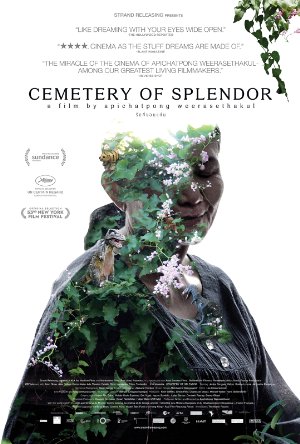Cemetery of Splendor (2015)
November 15, 2016 12:11 AM - Subscribe
A group of soldiers in a small town on the Mekong River in northern Thailand are struck with a bizarre sleeping illness.
It's a wonderful film. Not surprising since Apichatpong hasn't made a bad film yet. I watched this before the election heated up, so now a lot of it is a little blurry in memory, but I wanted to echo your point on how subtle Apichatpong is with metaphor. It's always there and right in front of you, but his films are so gentle and, as you say, patient, that it simply becomes enmeshed with the experience of life he shows. The metaphoric level isn't subtext or text in that way, just another layer to life. The character's interactions with minor deities and the unconscious soldiers too are a layering of what is present in life, but is simultaneously not "there". The dry sense of humor and pleasure in his films and minimal active conflict distance the more dramatic elements of life and art to focus more on the mundane activities that constitute the most of our existence. Which is, partly, what makes watching his movies feel so peaceful, even while there is that undercurrent of metaphor speaking to bigger issues and even when we might not fully understand or appreciate what's going on in the movies at first glance. They draw you into the world of the film and its character's first, and then, if you're interested, you might start to untangle some of the other layers that co-exist with the mundane.
I've long believed that Apichatpong is the great non-literary filmmaker. Non-literary in the sense his movies don't follow a storyline as in most books or movies, and because they seem to almost not be written, just inhabited. The emphasis isn't on ideas as expressed in words, or perhaps not even ideas at all in the usual sense, so they don't fit the same models of discursive rationality we normally might expect to find in movies. They instead rely on non-discursive logic, which is something like an emotional logic, but one that isn't understood via easily named emotions, like anger, sorrow, joy, or the like, but through aesthetic "rightness" or just the feeling it all makes sense and that what we're shown follows an ineffable logic that results in gestalt. At least that's how it is for me and at least a few other Apichatpong fans anyway.
posted by gusottertrout at 2:18 AM on November 16, 2016 [4 favorites]
I've long believed that Apichatpong is the great non-literary filmmaker. Non-literary in the sense his movies don't follow a storyline as in most books or movies, and because they seem to almost not be written, just inhabited. The emphasis isn't on ideas as expressed in words, or perhaps not even ideas at all in the usual sense, so they don't fit the same models of discursive rationality we normally might expect to find in movies. They instead rely on non-discursive logic, which is something like an emotional logic, but one that isn't understood via easily named emotions, like anger, sorrow, joy, or the like, but through aesthetic "rightness" or just the feeling it all makes sense and that what we're shown follows an ineffable logic that results in gestalt. At least that's how it is for me and at least a few other Apichatpong fans anyway.
posted by gusottertrout at 2:18 AM on November 16, 2016 [4 favorites]
You are not logged in, either login or create an account to post comments

Sadly I'm not very familiar with Thailand's political history so this aspect of the film escaped me at the time of viewing but reading on it afterwards I understand that Cemetery of Splendor is deeply political. From NYBooks: Also, a nice article on and interview with Weerasethakul from Film Comment.
posted by sapagan at 12:57 AM on November 15, 2016 [4 favorites]